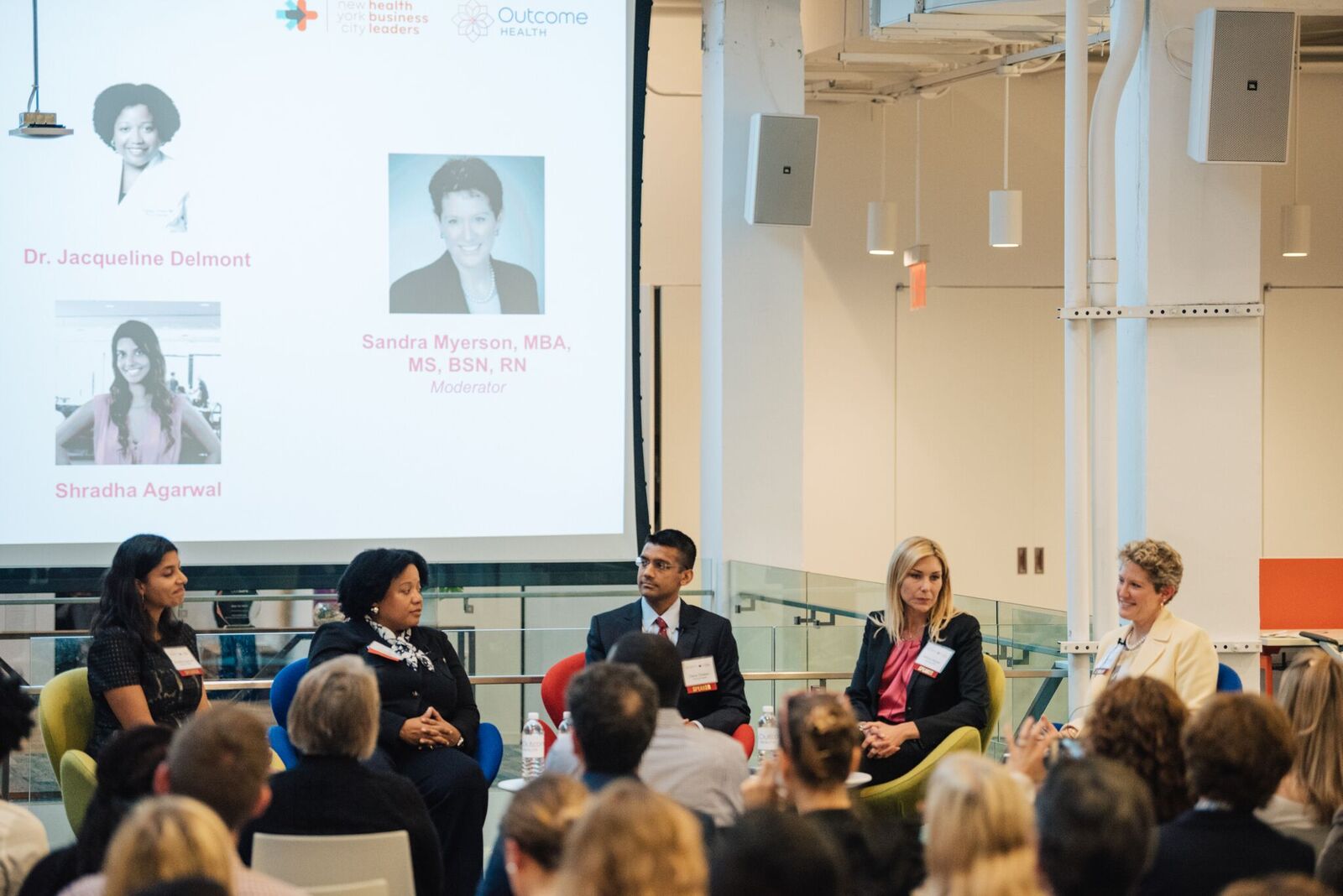
In April, members of the NYC Health Business Leaders (NYCHBL) gathered for a discussion at Outcome Health’s Midtown office to discuss the transforming landscape of patient-provider interactions and how to improve outcomes.
NYCHBL President Bunny Ellerin explained, “We wanted to assemble a panel of experts to discuss real-world solutions on how we as healthcare leaders can enable patients to become better engaged and activated in their healthcare.”
The panel included Allison Harper, Sr. Brand Manager at Novo Nordisk; Dr. Dave A. Chokshi, Chief Population Health Officer at OneCity Health; Dr. Jacqueline Delmont, President/CEO of Delmont Healthcare Consultants; Shradha Agarwal, Co-founder/President of Outcome Health; and Sandra Myerson, Patient Experience Improvement Leader at SLM Consulting. We assembled to discuss real-world solutions on how we as healthcare leaders can enable patients to become better engaged and activated in their healthcare.

According to Agarwal, the fragmentation of the healthcare industry makes it difficult for patients to fully own their healthcare journey. But with the right tools, every stakeholder can finally come together to participate in the conversation.
“As soon as a patient feels empowered in that conversation, we see the quality of the conversation improve,” said Agarwal. “More interestingly, the quality of compliance improves as well, resulting in better health outcomes.” (As reported by Kantar Media.)
The average person visits a doctor 5 to 10 times per year with an average wait time of about 35 minutes and an additional 14 minutes in the consultation room—all before the doctor comes in. That’s a significant amount of time spent at providers’ offices and, in Agarwal’s words, “…an opportunity to really educate and empower patients with the right knowledge.” By partnering with providers, and life science and lifestyle brands, Outcome Health’s waiting room screens and exam room tablets provide patients with relevant content at the most critical moments of care. These digital tools offer information about clinical trials, new therapies, and health assessments are all within reach, which ignites patients with curiosity to ask their providers the right questions.
Patients as Consumers
It’s this accessibility to information that causes the consideration of patients as “consumers.” Sandra Myerson shared that 72% of Internet users researched information related to their health in the past year. Technology today can connect patients to their physicians and their clinical teams in ways that previously did not exist, however, the panel agreed that the promise of technology in healthcare has yet to be fully realized.
“People want real-time for everything and this expectation has been translated into healthcare; it’s the same customer,” said Myerson. “We just tend to have this legacy protocol of the physician dictating what the patient needs and when and how.”
Many providers agree that current healthcare technology distracts from the patient-provider experience. In a study published in the Annals of Internal Medicine, for every hour that a physician spends with a patient, two hours are spent with a computer—which some doctors have coined the “iPatient.”
“I feel like those of us who really want to push the envelope and move toward a transformed system don’t always acknowledge the underbelly of what’s actually happening with respect to the intersection of technology and healthcare,” said Dr. Chokshi.
Make Patients Co-creators of Health
In order to create fully empowered patients, they must have access to information at both the moments of care and outside of it. We need to provide them with care and attention when they’re in-between visits, making them consumers of their own health information and decisions. Allison Harper detailed that physicians who leverage technologies post-visit (such as sending reminders about therapy adherence and information from brand partners), report that their patients are more informed and have more ownership.
“Patients feel like they’re a co-creator of their health decisions instead of a recipient,” said Harper.
Agarwal explained that technology provides patients with a common language. Health assessments allow patients to easily answer a series of questions and gain a better understanding of their conditions and diagnoses, thus prompting the next conversation they have with their doctor.
Some are resistant to labeling patients as “consumers” and I can understand both sides. Individuals living with chronic conditions have unique needs and shouldn’t be lumped together into personas and demographic groups. But on the other side, it’s a missed opportunity not to offer access to information and resources for something as critical as an individual’s own health.
As healthcare in the U.S. continues to move towards shared decision-making, patients will be empowered to leverage their provider’s expertise to reach a joint decision that they both understand and believe is the best approach for their own unique healthcare needs. There is a massive opportunity for more stakeholders to help providers and their patients to have more effective interactions and to positively impact health outcomes.
It’s time for us as healthcare business leaders to better meet the needs the current market demands.






